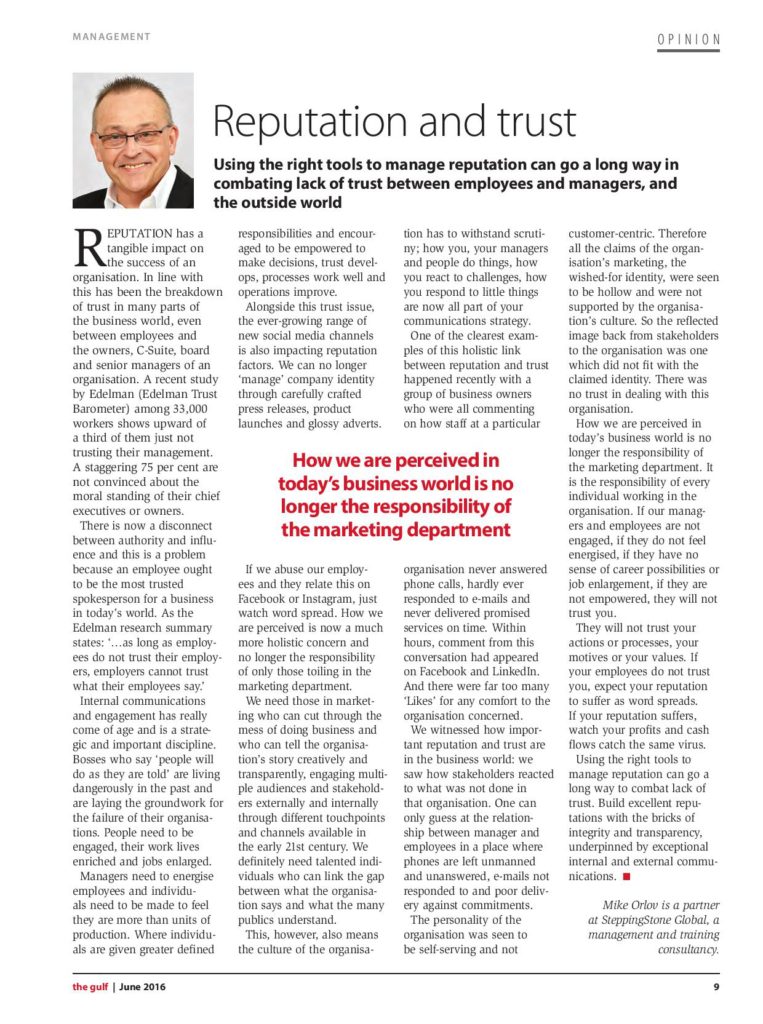
Reputation has a tangible impact on the success of an organization. In line with this has been the breakdown of trust in many parts of the business world, even between employees and the owners, C-Suite, board and senior managers of an organization. A recent study by Edelman (Edelman Trust Barometer) amongst 33,000 workers shows upward of a third of them just not trusting their management. A staggering seventy five per cent of respondents are not convinced about the moral standing of their CEOs or owners.
There is now a disconnect between authority and influence and this is a problem because an employee ought to be the most trusted spokesperson for a business in today’s world. As the Edelman research summary states: ‘…as long as employees do not trust their employers, employers cannot trust what their employees say.’
Internal communications and engagement has really come of age and is a strategic and important discipline. Those bosses who say ‘people will do as they are told’ are living dangerously in the past and are laying the groundwork for the failure of their organizations. People need to be engaged, their work lives enriched and their jobs enlarged.
Managers need to energize their employees and individuals need to be made to feel they are more than units of production. Where individuals are given greater defined responsibilities and encouraged to be empowered to make decisions, trust develops, processes work well and operations improve.
Alongside this trust-issue, the ever-growing range of new social media channels is also impacting reputation-factors. We can no longer ‘manage’ the company identity through carefully crafted press releases, product launches and glossy advertising campaigns.
If we abuse our employees and they then relate this on Facebook or Instagram, just watch word spread. How we are perceived is now a much more holistic concern and no longer the responsibility of only those toiling in the marketing department.
We need those in marketing who can cut through all of the mess of doing business and who can tell the organization’s story in a creative and transparent way, engaging multiple audiences and stakeholders both externally and internally through all the different touchpoints and channels available in the early 21st century. We definitely need talented individuals who can link the gap between what the organization says and what the many publics understand.
This however also means the culture of the organization has to withstand scrutiny; how you, your managers and your people do things, how you react to challenges, how you respond to the little things are now all part of your communications strategy.
One of the clearest examples of this holistic link between reputation and trust happened recently with a group of business owners who were all commenting on how staff at a particular organization never answered phone calls, hardly ever responded to emails and never delivered promised services on time. Within hours, comment from this conversation had appeared on Facebook and Linked In. And there were far too many ‘Likes’ for any comfort to the organization concerned.
We witnessed how important reputation and trust factors are in the business world: we saw how stakeholders reacted to what was not done in that organization. One can only guess at the relationship between manager and employees in a place where phones are left unmanned and unanswered, emails not responded to and poor delivery against commitments.
The personality of the organization was seen to be self-serving and not customer-centric. Therefore all the claims of the organization’s marketing, the wished-for identity, were seen to be hollow and were not supported by the organization’s culture. So the reflected image back from stakeholders to the organization was one which did not fit with the claimed identity. There was no trust in dealing with this organization; many people actually sigh when this organization is mentioned, and their shoulders droop at the thought of having to deal with it.
How we are perceived in today’s business world is no longer the responsibility of the marketing department. How our organizations are perceived is the responsibility of every individual working in the organization. If our managers and employees are not engaged, if they do not feel energized, if they have no sense of career possibilities or job enlargement, if they are not empowered, then they will not trust you.
They will not trust your actions or processes, they will not trust your motives and they will certainly not trust your values. If your employees do not trust you, expect your reputation to suffer as word spreads. If your reputation suffers, watch your profits and cash flows catch the same virus.
Using the right tools to manage reputation can go a long way in combating lack of trust. Build excellent reputations with the bricks of integrity and transparency, underpinned by exceptional internal and external communications.
